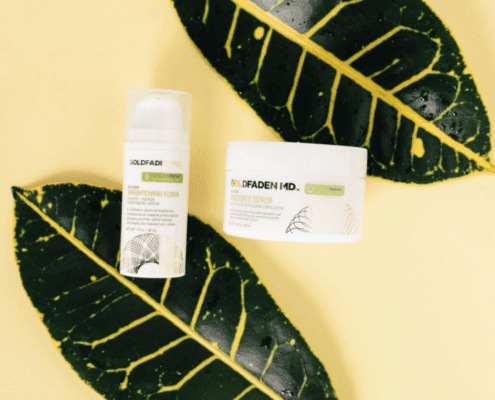
Hydrate + Shield
Whether your skin type is oily, normal, combination or dry, moisturizing should be a regular part of your daily skin care regimen. Unfortunately, many people with oily skin believe that using any moisturizer would be counterproductive and only serve to compound their problem. The truth is that it all depends on the moisturizer you use. Everyone needs a moisturizer, but different skin types require different types of products.
For Oily Skin
If you have oily skin, instead of avoiding moisturizers altogether, you should select one that’s “water-based”. Water-based moisturizing formulas are the most common type found on the market today. These moisturizers list water as their chief ingredient and often include such active constituents as hyaluronic acid to help improve their water-binding properties.
Hyaluronic acid is a large, sugar-like molecule that’s found in virtually every tissue of your body. As a key ingredient in your skin’s extracellular matrix, it plays a significant role in maintaining moisture and softness. Hyaluronic acid is an ideal moisturizer because it can attract and retain 1000 times its own weight in water (a feat unmatched by any other substance in nature). The volumizing effect it has on your skin adds vital fullness that can minimize facial wrinkles. This type of moisturizer often comes in a lightweight gel and may be labeled “non-pore clogging”, “oil-free” or “noncomedogenic”.
Another excellent emollient that we highly recommend and use in many of our formulations is squalene. Derived from olives, squalene is a natural, organic compound that leaves skin soft and supple without an unpleasant, greasy feel, making it an attractive choice for people with oily complexions. Squalene absorbs quickly and penetrates deeply to help accelerate new cell growth. It even discourages microorganisms that can block normal healthy cell development by forming a protective coating on your skin.
For Dry and Sensitive Skin
The most important thing to consider when picking a good moisturizer for dry skin is the degree of dryness. Generally speaking, there are only a few basic types of moisturizers to choose from: gel, lotion, or cream. The heavier and denser a moisturizer is, the more moisturizing elements it contains. Gel is the lightest preparation, followed by lotion, with cream providing the heaviest dose of moisture. If your skin happens to be only slightly dry, a lightweight gel that’s water-based can sometimes get the job done. If your skin is somewhat drier and loses moisture more quickly, you may require a lotion that supplies a heavier dose of moisturizing ingredients. If your skin is extremely dry, however, you might need to use an oil-based cream or an oil. You should steer clear of products that use mineral waxes, mineral oils or other ingredients that can clog your pores and trap perspiration. This makes a fertile breeding ground for acne-causing bacteria.
Sensitive skin types should be very careful when choosing a moisturizer as many products on the market contain synthetic ingredients. Although these moisturizers generally don’t cause an adverse reaction in the majority of people, they can be very irritating to women with sensitive skin. If your skin is easily irritated, you should look carefully for a moisturizer that’s labeled hypoallergenic. These moisturizers are free of all dyes, preservatives, and fragrances. Simple is better. Products that contain the fewest ingredient are best, especially when they include natural oils and other nutrients like vitamins and minerals that nourish and rejuvenate your skin.
Protect + Shield
Even with all the public service warnings today concerning the damage caused by UV exposure, there are still some people who don’t seem to realize they need sunscreen.
The truth is that anyone can suffer the harmful effects of overexposure to the sun. Even if you happen to have olive or darker skin, you should still wear sunscreen. While it’s true that people with dark skin don’t need to worry as much about sunburn as those with fairer complexions, anyone can suffer the deleterious effects of sun damage. Every person, regardless of their ethnic background, can benefit from wearing a sunscreen with an SPF of 15 at all times, especially if they’re going to be spending a lot of time outdoors.
Certain people also believe that they only need to use sunscreen at particular times of the year. It’s important to realize that just because you don’t feel the heat of the sun, it doesn’t mean that harmful UV rays are not affecting you. You can get sunburned in the middle of winter when there’s three feet of snow on the ground and it’s 10 degrees below zero. You should always wear sunscreen if you’re going to be spending time outside, no matter what time of year it is.

 Photo via
Photo via 